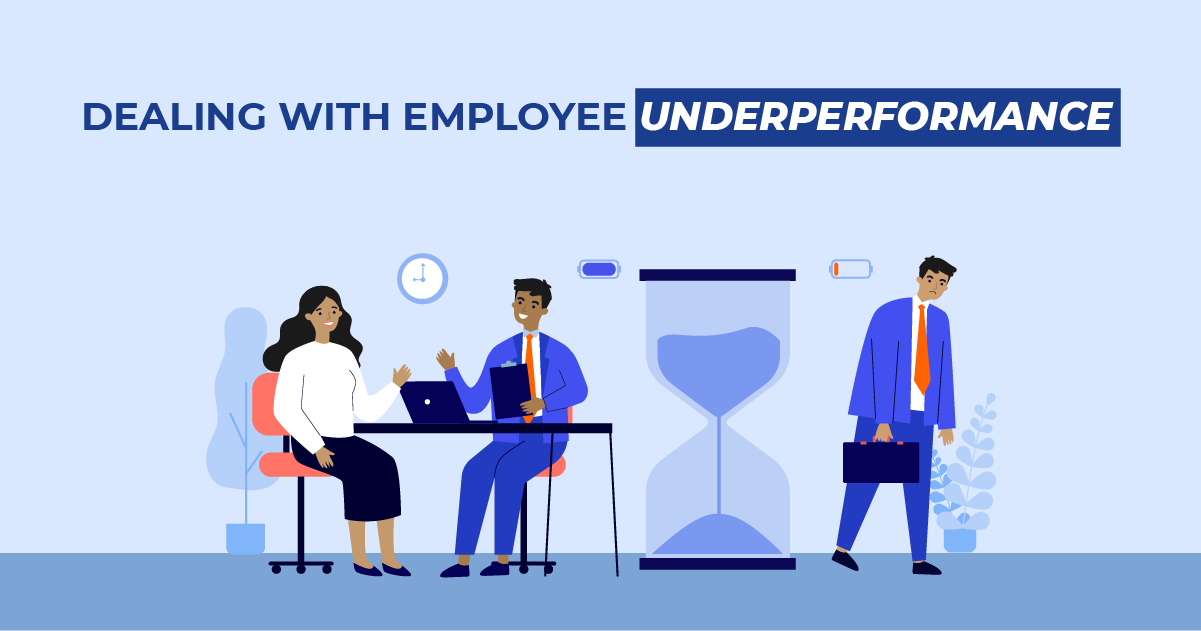Underperformance can crop up slowly and silently among employees, especially with many people still working remotely. This can cause a huge domino effect among employees and eventually lead to low business productivity.
Underperformance is when an employee performs their duties below the required level that has been set and is expected of them.
Causes of underperformance –
There are many reasons why an employee might be underperforming. It’s important to note that not all underperformance is due to the employee rebelling, being lazy, or simply being insubordinate. Below are some reasons why an employee might be underperforming.
Low remuneration – It’s not unheard of for employees to feel like they are being overworked and underpaid; this often leads to low morale and underperformance. It is essential that employees feel rewarded and praised for their hard work, so good companies set up reward systems to keep employees satisfied and happy.
Lack of growth opportunities – The reassurance of growth opportunities is imperative to drive motivation in some employees. If there’s no clear path to progress, then underperformance will set in while they look for better opportunities elsewhere.
Lack of communication – Expectations must be clear and regularly give updates to keep employees informed and involved. If job standards and organisational goals are unclear, employees won’t know precisely what is expected. Proper communication gives them a sense of belonging and ownership and allows for bright suggestions if problems arise.
Burn out – It’s one thing to work hard, and it’s another thing to be overworked. There’s no productivity in being overworked; when employees are stressed or burnt out, they won’t work correctly no matter how hard they try.
Personal issues – This might not be related to the workplace, and you might feel like it isn’t your concern, but like it or not, it affects you as an employer. Challenging circumstances in employees’ personal lives can impact their ability to concentrate on tasks, so you have to be emotionally intelligent in dealing with such cases.
Poor working environment – Comfort is paramount when working anywhere, especially a 9-5. If your company can’t afford a comfortable working environment yet, why not explore the option of working remotely?
Inadequate resources – Employees need the right resources to get the job done. You can’t provide them with low-quality resources and expect high-quality results in return.
Other reasons –
- Poor onboarding
- Lack of training and development opportunities
- Job dissatisfaction
Dealing with underperforming employees
Recognise the problem – You must identify the root cause of the employee’s underperformance. Send surveys, have one-on-one sessions and ask questions that will help you get insights into the employee’s behaviour. As soon as you notice that an employee is underperforming, you need to act, share constructive feedback and exchange ideas on how you can help improve employee performance.
Here are some questions to ask –
- What frustrates you about your job? Are there any areas that you feel ill-equipped for?
- How well are you handling your current workload?
- Is there anything the company can do to improve your performance?
- Are there any external factors that could be affecting your work?
- Do you feel optimistic about your future with the company?
- Is there anything else you want to share with me?
Listen attentively to the employee’s responses and ask follow-up questions to understand them better and demonstrate your interest in their side of the story. Make the atmosphere feel as safe as possible.

Manage expectations – Ensure that the employee understands what you expect of them and the areas that require improvement. You must also tackle expectations and discuss what they have hoped for from their job and the organisation to see if it is realistic. If there is a mismatch between what they expect and what you can offer, this is an excellent time to discuss whether they can adjust their expectations or not.
Develop a feasible action plan – When it comes to developing a feasible action plan, both sides opinions must be outlined; take time out to draw up a roadmap to improvement and based on the cause of the underperformance, your plan should outline actions of each party if possible, give clear timelines, and provide support where you can
Follow up and give feedback – It’s not enough for you to give a plan and move on, even though you might be busy with so many other things and employees but you must follow through and follow up. Ensure you monitor the employee, monitor timelines and give praise where necessary. Providing specific and constructive feedback to an employee who is striving to improve their performance is essential. It will help them see their progress and be aware of areas that still need development.
Steps to take if no improvements are made
There are situations where an employee won’t make progress despite your efforts. So what do you do?
- Have another one-on-one session to discuss feedback
- Reassign the employee if you can – This happens in cases where an employee could be better suited for one position than another.
- Termination – It sucks to do this but the company comes first. When you’ve exhausted all your options, it’s okay to consider letting the employee go.
Get insights into employee satisfaction and performance with the FREE Jobberman Employee Satisfaction Report. This report takes a detailed look into employee satisfaction among Nigerian employees. This report explores themes around employee happiness, flight risk, job satisfaction and delves into insights based on age, gender, location, job level, and work experience for a demographic overview.
This report will keep you one step ahead. It can be used as a guideline to prioritise employee satisfaction in the workplace and improve productivity and overall long-term organisational success. DOWNLOAD HERE





